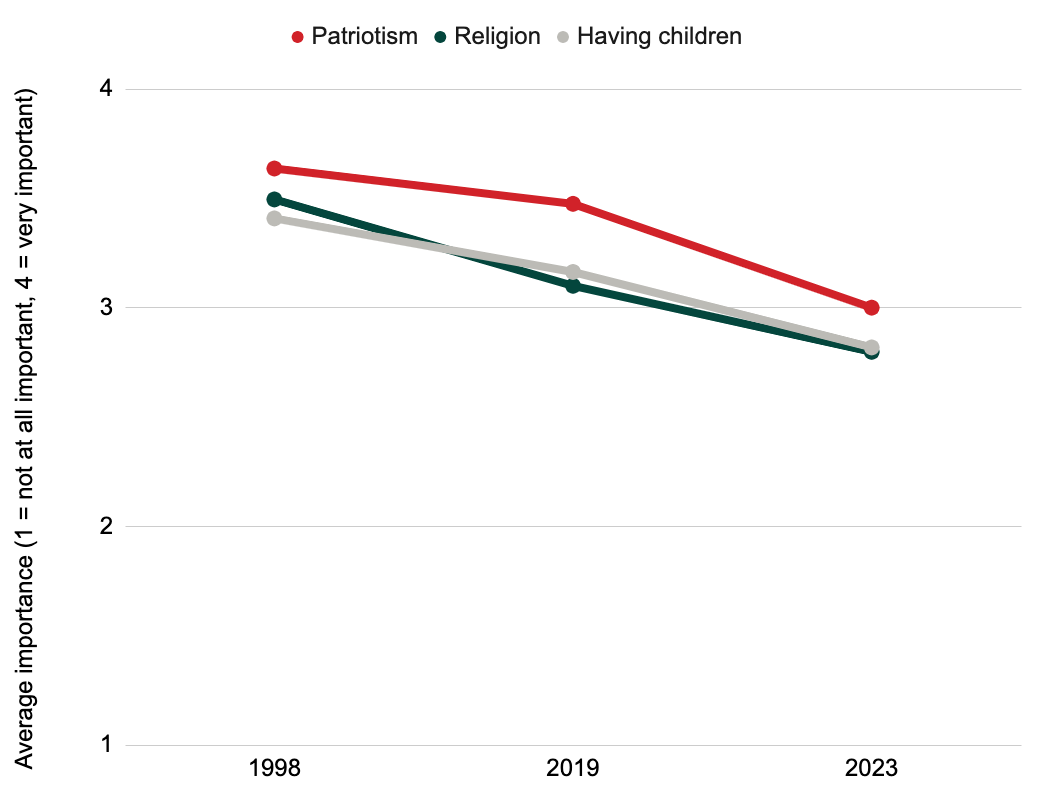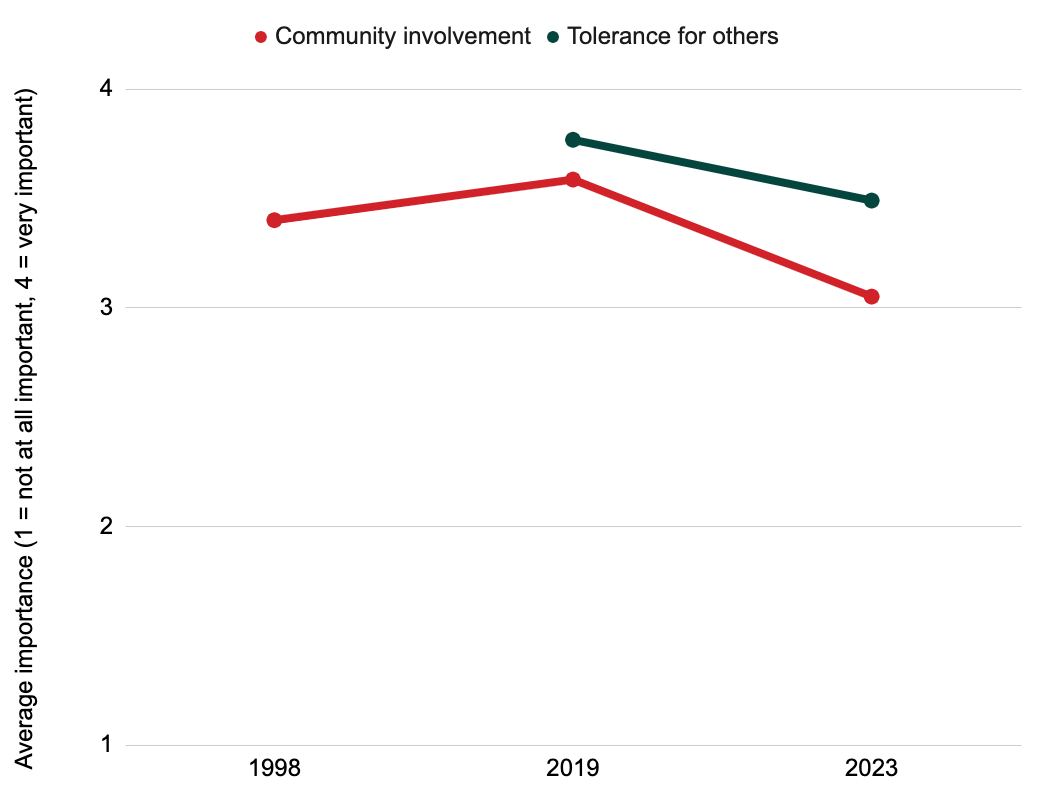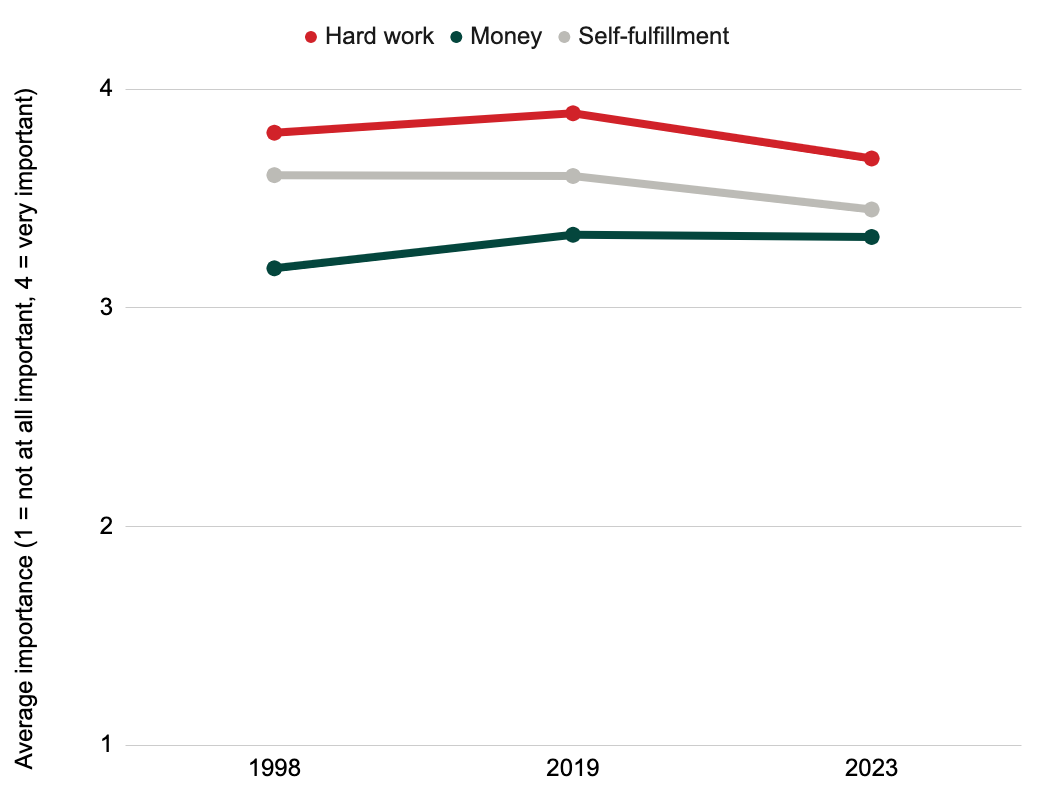In December 2021, when I learned that the biologist E.O. Wilson had died at age 92, I realized that I had never read any of his books, so I picked up a copy of On Human Nature, his 1978 Pulitzer Prize-winning illumination of the field of sociobiology that he is widely credited with developing. “Human social evolution,” Wilson observes, “proceeds along a dual track of inheritance: cultural and biological. Cultural evolution is very fast, whereas biological evolution is usually very slow.” I was reminded of these words when I was confronted with the sobering results of a Wall Street Journal survey of American citizens’ values earlier this week.
The poll, conducted in collaboration with the National Opinion Research Center (NORC) at the University of Chicago, indicates a sharp decline over just the last four years in the percentage of Americans who describe community involvement, patriotism, religion, and having children as “very important” to them, and a rise in the percentage of those who assign great importance to money. These survey outcomes have attracted much attention this week—and some caveats as well. The writer Patrick Ruffini, for example, noted that the 2023 poll was conducted online, whereas prior iterations were administered via telephone. “If I’m speaking to another human being over the phone,” writes Ruffini, “I am much more likely to answer in ways that make me look like an upstanding citizen. My answers to the same questions online will probably be more honest, since the format is impersonal and anonymous.”
For my part, I was skeptical that reports on the survey results focused on the “very important” response option to the exclusion of other answer choices (i.e., “somewhat important,” “not that important,” and “not important at all”) and wondered whether the downward trends were overstated. With this misgiving in mind, I sourced the 1998 and 2019 outcomes as well as the 2023 results to calculate weighted averages of participant responses to each question on a four-point scale, from “not important at all” (one point) to “very important” (four points). The patterns over time, I was disheartened to discover, were essentially identical to those reported by the Journal, with attributes of a collectivist culture broadly diminishing (“patriotism,” “religion,” “having children,” “community involvement,” and “tolerance for others”) and those of an individualistic culture holding relatively steady or advancing (“hard work,” “money,” and “self-fulfillment”).



We stand with feet in both cultural currents—collectivism and individualism—at MICDS. “Our School encourages and praises meaningful individual achievement,” our Mission Statement declares, and “prepares young people for higher learning”; but it also commits us beyond ourselves, to morality (“stand for what is good and right”), selflessness (“lives of service”), community (“embrace all people with compassion”), patriotism (“our nation needs responsible men and women”), and global citizenship (“meet the challenges of this world”). Even accounting for Ruffini’s online-versus-phone survey method qualification, the results of this year’s WSJ/NORC poll require that we at MICDS, in consonance with our Mission, both acknowledge and respond to the waning of collectivist culture in the United States. In a time of social fraying and tearing, we must resolve ourselves to be knitters and gluers, intentionally and strategically, in service to our community, our nation, and our world.
“Cultural evolution is very fast,” E.O. Wilson informs us—and so, unfortunately, does this week’s Wall Street Journal—but “biological evolution is usually very slow,” and On Human Nature is replete with examples of the tortoise rescuing the hare. Wilson quotes the literary critic Lionel Trilling in this vein: “There is a hard, irreducible, stubborn core of biological urgency, and biological necessity, and biological reason, that culture cannot reach and that reserves the right, which sooner or later it will exercise, to judge the culture and resist and revise it.”
Until biological necessity and reason come to our collective rescue—the innate, genetic knowledge that we are safer, stronger, and happier together than apart—let us continue to knit and glue in our MICDS community all the more energetically, and happily, to advance the greater good, through “individual achievement” and “lives of service” alike. This is the increasingly countercultural and necessary work to which we are called in purpose together. If not we, then who?
Always reason, always compassion, always courage. My best wishes to you and your loved ones for the weekend ahead.
Jay Rainey
Head of School
